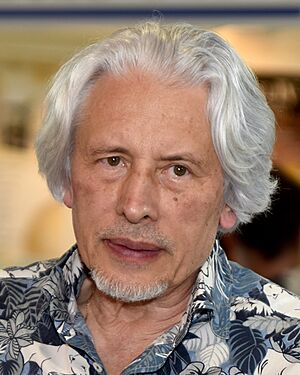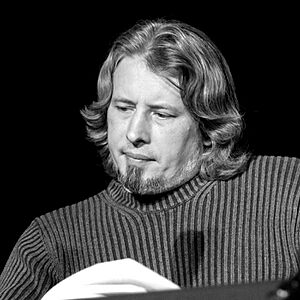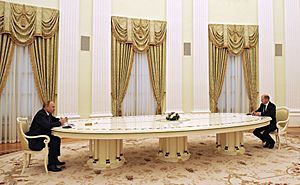Vladimir Sorokin facts for kids
Quick facts for kids
Vladimir Sorokin
|
|
|---|---|

Sorokin in 2023
|
|
| Born | Vladimir Georgiyevich Sorokin 7 August 1955 Bykovo, Moscow Oblast, Russian SFSR, Soviet Union |
| Occupation |
|
| Language | Russian |
| Citizenship | Russian |
| Alma mater | Gubkin Russian State University of Oil and Gas |
| Period | Contemporary |
| Genres | |
| Literary movement | Russian postmodernism |
| Years active | since 1977 |
| Notable works | Ice (2002), The Blizzard (2010) |
Vladimir Georgiyevich Sorokin (Russian: Влади́мир Гео́ргиевич Соро́кин) is a famous Russian writer. He was born on August 7, 1955. He writes novels, short stories, and plays.
Sorokin is known for his unique and often surprising stories. His works mix different styles and ideas. He often uses elements of dystopia, which are stories about imaginary bad futures. He also uses alternative history, where he imagines what if past events happened differently.
His writing often includes humor and exaggeration. He can imitate many different writing styles. This makes his books very interesting and sometimes challenging to read. In Russia, his books have often caused public discussions. Since 2022, he has been living in Berlin.
Contents
About Vladimir Sorokin
Early Life and Education
Vladimir Sorokin was born in Bykovo, Ramensky District, Moscow Oblast. This is a town in the Moscow region. In 1972, when he was 17, his first writing was published. It appeared in a newspaper called Za kadry neftyanikov.
He went to the Gubkin Russian State University of Oil and Gas in Moscow. He studied engineering there. He finished his studies in 1977.
Career Beginnings
After college, Sorokin worked as an illustrator. He drew pictures for a magazine called Shift. He left this job after one year. He did not want to join a youth organization called the Komsomol.
In the 1970s, Sorokin also showed his art in exhibitions. He designed and illustrated almost 50 books. He grew as a writer among artists and writers in Moscow. These artists were part of an "underground" scene in the 1980s. This meant their art was not officially approved by the government.
In 1985, some of Sorokin's stories were published in a magazine in Paris. In the same year, his novel The Queue was published in France.
First Publications in Russia
During the Soviet era, many of Sorokin's works were not allowed. This included his first novel, The Norm (1983). These works were seen as "nonconformist art." This means they did not follow the government's rules for art.
His first book published in the USSR was in November 1989. A Latvian magazine called Rodnik published some of his stories. Soon after, his stories appeared in other Russian magazines. In 1992, his book Sbornik Rasskazov (Collected Stories) was published in Russia. This book was nominated for a Russian Booker Prize.
Sorokin has described his early writings. He said they were like "little binary literary bombs." They mixed official Soviet ideas with real-life details. This mix created an "explosion" that gave him a feeling of freedom.
Awards and Recognition
Vladimir Sorokin has received several important awards. In September 2001, he won the People's Booker Prize. Two months later, he received the Andrei Bely Prize. This award is for great contributions to Russian literature.
In 2002, his book Blue Lard caused public discussion.
His 2006 novel, Day of the Oprichnik, describes a future Russia in 2027. In this story, Russia has a Tsar and a "Great Russian Wall." He won the Premio Gregor von Rezzori for this novel in 2015.
In 2011, he received the second prize of the Russian Big Book award for his novel The Blizzard. He received another second prize for Telluria three years later.
In December 2019, a documentary film about his life was released. It was called "Sorokin Trip." The film was nominated for an award.
Views on Current Events
After the events of February 2022, Sorokin shared his strong opinions. He wrote an article criticizing the actions of Vladimir Putin. He compared Putin to historical figures like Ivan the Terrible.
Sorokin wrote that Putin wanted to bring back the Russian Empire. He believed Putin saw the West as an enemy. He also mentioned how important free media was.
Sorokin believes that Putin's goal is to weaken NATO and Western countries. In March 2022, Sorokin joined other writers. They signed an appeal asking Russian speakers to share the truth about the situation.
Because of his criticism, some of Sorokin's books were removed from Russian bookstores.
Personal Life
Sorokin is a devout Christian. He was baptized when he was 25 years old.
Translated Works
Sorokin's books have been translated into many languages. These include English, French, German, Spanish, and Japanese. His books are available from many well-known publishers around the world.
See also
 In Spanish: Vladímir Sorokin para niños
In Spanish: Vladímir Sorokin para niños
 | Jewel Prestage |
 | Ella Baker |
 | Fannie Lou Hamer |



